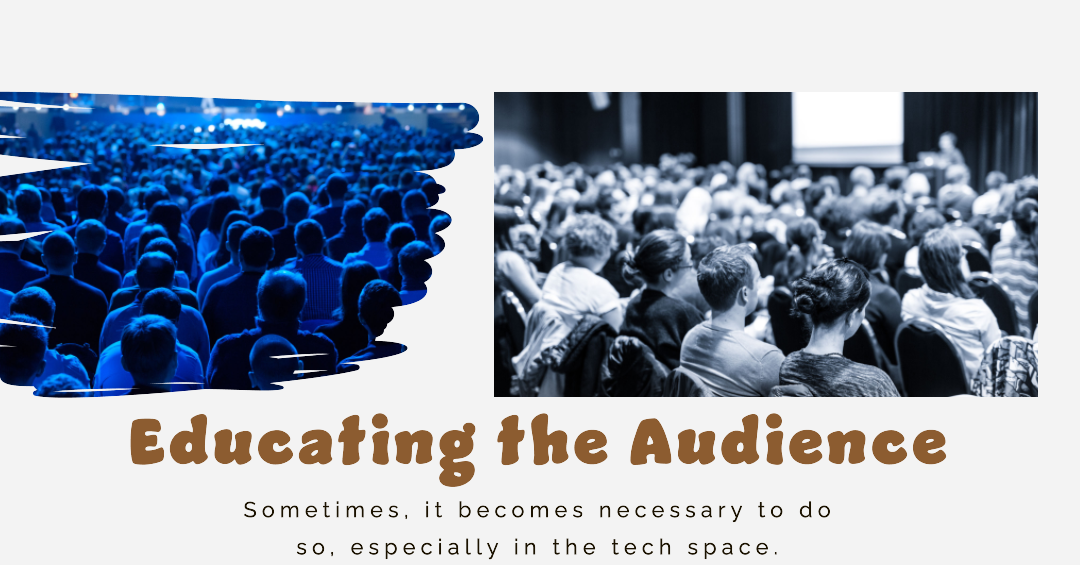So the question – Is it prudent for tech companies to educate their target audience as part of their marketing? How effective is education-based marketing for them?
There’s an old saying in Marketing – Educating an audience can not only be time-consuming but also cost-prohibitive. It can involve creating educational content, conducting market research, and targeting specific audiences through various channels.
At the same time, companies must not forget that educating their target audience can also have many benefits, such as building trust and credibility with your customers, establishing your business as an authority in your industry, and ultimately driving sales.
So, what does a tech company do? Does it go ahead with educating its audience or not?
Here’s a tip: The process doesn’t necessarily have to be expensive or time-consuming. For example, you could create educational content in the form of blog posts, social media posts, or videos that you can share with your audience for free. You could also conduct surveys or interviews with your customers to better understand their needs and preferences.
Ultimately, the decision to focus on educating your audience as part of your marketing strategy will depend on your business goals, target audience, and available resources. It’s important to weigh the potential benefits and costs and make an informed decision based on your specific circumstances.
In today’s digital age, technology companies face fierce competition in the marketplace. To stand out and succeed, they need to develop effective marketing strategies that not only promote their products or services but also educate their target audience. But is educating the audience the right approach for tech companies, and does it lead to better outcomes?
What Does Educating Audience Really Mean?
Firstly, it’s important to understand what we mean by educating the audience. In the context of marketing, educating the audience refers to providing them with information about a product or service and its benefits that they may not already know. This can include explaining the features of the product, how it works, and how it can help solve a problem or meet a need.
One of the main benefits of educating the audience is that it can help build trust and credibility with potential customers. By providing them with valuable information, tech companies can establish themselves as experts in their field and demonstrate their commitment to customer service. This can help to differentiate them from competitors who may be more focused on selling products without providing any context or information.
Another advantage of educating the audience is that it can help to create a sense of community and foster loyalty among customers. By providing them with information that they may not have been aware of, tech companies can help customers feel more empowered and informed. This can lead to greater satisfaction with the product or service and increased brand loyalty.
Some Cost-effective Ways To Educate Your Audience
- Create blog posts that provide valuable information and insights on topics relevant to your audience.
- Use infographics to visually present complex information in an easy-to-understand format.
- Create videos that demonstrate how to use your products or services, or that provide educational content on industry topics.
- Webinars are a great way to educate your audience about your product or service in a more interactive and engaging way. You can use webinars to demonstrate how your product works, answer common questions from customers and provide tips and tricks for getting the most out of your product.
- Creating short video tutorials is an effective way to educate your audience about your product or service. By providing step-by-step instructions on how to use your product or service, you can help your target audience overcome any barriers to adoption and increase their satisfaction with your product.
- Leverage social media platforms to share educational content with your audience. You can share links to your blog posts, infographics, and videos on social media to reach a wider audience.
By providing valuable and educational content to your audience, you can help them make informed decisions and build trust and credibility with them. This can lead to increased customer loyalty and sales for your business.
Potential Downsides
However, there are also some potential downsides to educating the audience as part of a marketing strategy. For one, it can be time-consuming and sometimes costly to create educational content and distribute it to the target audience. Additionally, not all customers may be interested in receiving educational content or may prefer to make purchasing decisions based on other factors, such as price or brand reputation.
So, is educating the audience the right approach for tech companies? The answer is not a simple yes or no. It really depends on the specific company, product, and target audience. Tech companies that offer complex products or services that require explanation may benefit from educating their target audience. However, those that sell more straightforward products or services may not need to devote as much time and resources to educating their audience.
Ultimately, the best approach is to strike a balance between promoting the product or service and educating the audience. Tech companies should aim to provide enough information to help potential customers make informed decisions without overwhelming them with too much technical jargon or unnecessary details. By doing so, they can build trust, credibility, and loyalty among their target audience, while also achieving their marketing objectives.
Subscribe to our blog

Leave a Reply